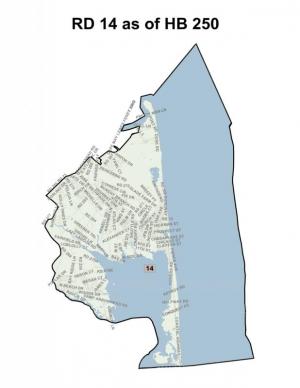There are two candidates for the 14th Representative District race – Republican challenger James DeMartino and Democratic incumbent Pete Schwartzkopf, who has represented the district since 2002 and serves as speaker of the house. The district includes parts of the Lewes ZIP code, as well as all of Rehoboth Beach, Dewey Beach, Henlopen Acres and Angola.
Party: Republican
Age: 59
Education: B.A., The Citadel; J.D., Fordham Law School
Occupation: Attorney
Residence: Lewes
Family: Two adult sons
Relevant experience: Raised a family, military service, government contracting, small business consultant and owner, lawyer
Party: Democrat
Age: 61
Education: Bachelor of science, human resource management, Wilmington University
Occupation: Representative District 14 legislator; Speaker of the House of Representatives
Residence: Rehoboth Beach
Family: Wife, Carol; four children; six grandchildren
Relevant experience: Representative District 14 legislator since 2002; Delaware State Police for 25 years
• There were no pedestrian deaths along Route 1 this past summer. Are the pedestrian issues solved? What other improvements should be made?
James DeMartino – There may not have been fatalities, but there were a number of bicycle accidents. No, the pedestrian issue is not resolved. Additional signs should be placed to direct pedestrians to the nearest crosswalks and bicycle signs should be posted to remind vehicles of their presence. Bicycles, although allowed on the sidewalks, should still ride in the direction of traffic. This will reduce the unexpected bicyclist crossing in front of an oncoming motorist when entering or exiting parking lots and streets. Bicycle rental locations should provide a copy of the rules of the road for cyclists and a safety checklist.
Pete Schwarztkopf – In 2013, I co-chaired a Route 1 task force with Sen. Ernie Lopez. We recommended and funded sidewalks on both northbound and southbound lanes and increased street lighting from Five Points to the Lewes–Rehoboth Canal. We were able to get all pedestrians off of the roadway, and we strongly encouraged bicyclists to use the sidewalks as well. We also installed two HAWK system traffic lights which helped to provide pedestrians and cyclists safe passage while crossing Route 1. We identified the pedestrian issue and put measures in place to maximize pedestrian and bicyclist safety along Route 1.
• Is the district better served by a representative who is a high-ranking, agenda-setting member of the House or a legislative newcomer focused specifically on the district?
J.D. – This year the district will be better served by a legislative newcomer with a vision for the future that will also represent and fight for the concerns of the people. This year’s agenda will be dominated by increasing taxes to offset budget deficits, eliminating the senior tax credit, passing legislation supporting sanctuary status and a mileage tax. The residents of the district are mostly retirees on fixed incomes who cannot afford any increase in their taxes. Seniors and families need a representative to fight for their issues and not a party agenda-setting member.
P.S. – I may be a little biased in this response but there is no louder or stronger advocate for the district than the speaker of the house. As speaker, I am in a better position to ensure the district receives its fair share of services and road improvement funding as well as keeping an eye out for other areas of Sussex County. Additionally, I am in a stronger position to help the residents of the district, especially if they are dealing with any part of state government. As speaker, I have developed the relationships to get things done.
• This district is surrounded by water – Delaware Bay, Rehoboth Bay, Atlantic Ocean – and its communities have some serious stormwater management expenses coming. Should the state contribute more to initiatives to control stormwater and improve water quality?
J.D. – My answer depends on state initiatives – is this more regulation? Additional regulations only cost taxpayers money and do little to improve actual stormwater management or improve water quality. If the state, and possibly federal government, will contribute funds to provide assistance in solving these issues without increasing taxes, then I would say, “Yes.” I also say it depends if it is an existing community or a new development. Existing communities should receive assistance since these communities were initially approved for development by state agencies. New developments should require the developer and builder to provide for these requirements.
P.S. – The short answer is yes, but it is not so simple. Stormwater issues are exacerbated by poor land-use planning from the county. The county has full say in zoning issues and land-use approval. For a long time, the county has approved developments as if they were in a vacuum without fairly considering a project’s impact. The state then has to try to fix the stormwater problems after the projects are completed. The time to fix these issues is before the projects are approved and should be made a condition at the expense of the developer.
Chris Flood has been working for the Cape Gazette since early 2014. He currently covers Rehoboth Beach and Henlopen Acres, but has also covered Dewey Beach and the state government. He covers environmental stories, business stories and random stories on subjects he finds interesting, and he also writes a column called Choppin’ Wood that runs every other week. He’s a graduate of the University of Maine and the Landing School of Boat Building & Design.






















































